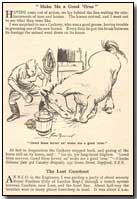Memoirs & Diaries - The Best 500 Cockney War Stories - The Lost Gumboot and Other Stories
 Published in London
in 1921, The Best 500 Cockney War Stories
comprised, in the words of its newspaper publisher (The London Evening
News) "a remembering and retelling of those war days when laughter
sometimes saved men's reason".
Published in London
in 1921, The Best 500 Cockney War Stories
comprised, in the words of its newspaper publisher (The London Evening
News) "a remembering and retelling of those war days when laughter
sometimes saved men's reason".
The collection of short memoirs, some 500 in total, is divided into five categories - Action, Lull, Hospital, High Seas and Here and There. This page contains five stories from Lull, led by The Lost Gumboot.
Other sections within the collection can be accessed using the sidebar to the right.
The Lost Gumboot
An N.C.O. in the Engineers, I was guiding a party of about seventy Royal Fusiliers (City of London Regt.) through a trench system between Cambrin, near Loos, and the front line.
About half-way the trenches were in many places knee-deep in mud. It was about 2 a.m. and shelling made things far from pleasant. Then word came up that we had lost touch with the tail-end of the party, and a halt was called, most of us standing in mud two feet deep.
The officer in charge sent a message back asking why the tail-end had failed to keep up.
The reply came back in due course: "Man lost his gumboot in the mud."
The officer, becoming annoyed at the delay, sent back the message: "Who's the fool who lost his gumboot?"
I heard the message receding into the distance with the words "fool" "gumboot" preceded by increasingly lurid adjectives.
In about three or four minutes I heard the answer being passed up, getting louder and louder: "Charlie Chaplin," "CHARLIE CHAPLIN," " CHARLIE CHAPLIN."
Even our sorely-tried officer had to laugh.
P. Higson, Lancashire
"Compree 'Sloshy'?"
During one of the Passchendaele advances in 1917 my battery was situated astride a board roadway leading over the ridge. After this particular show was over I happened to be in the telephone dug-out when prisoners started coming back.
One weary little lance-jack in a London regiment arrived in charge of an enormous, spectacled, solemn-looking Fritz. As he reached the battery position he paused to rest and look at the guns.
Leaning against the side of the dug-out he produced a cigarette end and, lighting it, proceeded to make conversation with his charge which, being out of sight, I was privileged to overhear.
"Ain't 'arf blinkin' sloshy 'ere, ain't it, Fritz? Compree sloshy?"
No reply.
He tried again. "Got a cushy job these 'ere artillery blokes, ain't they? Compree cushy?"
Still no answer.
He made a third attempt. "S'pose you're abart fed up with this blinkin' guerre. Compree guerre?"
Again the stony, uncomprehending silence; and then:
"Garn, yer don't know nuffink, yer don't, yer ignorant blighter. Say another blinkin' word and I'll knock yer blinkin' block orf."
A. E. Joyce (late R.F.A.), Swallowcroft, Broxbourne Road, Orpington, Kent
Looking-Glass Luck
During the second battle of Ypres, in May 1915, I was attached to the 1st Cavalry Brigade, and after a terrific strafing from Fritz there was a brief lull, which gave us a chance for a "wash and brush up."
While we were indulging in the luxury of a shave, a Cockney trooper dropped his bit of looking-glass.
Seeing that it was broken I casually remarked, "Bad luck for seven years." And the reply I got was, "If I live seven years to 'ave bad luck it'll be blinking good luck."
Mine that was His
Just before our big push in August 1918 we were resting in "Tank Wood".
The place was dotted with shell holes, one of which was filled with rather clean water, evidently from a nearby spring. A board at the edge of the hold bore the word "MINE", so we gave it a wide berth.
Imagine our surprise when later we saw "Tich", a lad from the Old Kent Road, bathing in the water. One of our men yelled, "Hi, Tich, can't yer read?"
"Yus," replied "Tich", "don't yer fink a bloke can 'is own writing?"
Walter F. Brooke (late R.W. Kent Regt.), 141 Cavendish Road, Highams Park, E.4
"Geography" Hour
Just before going over the top a private, wishing to appear as cheerful as possible, turned to his platoon sergeant and said: "I suppose we will be making history in a few minutes, sergeant?"
"No," replied the sergeant: "our first objective is about 250 yards straight to the front. What you have to do is to get from here to there as quickly as your legs will carry you. We are making geography this morning, my lad"
"Arras", London, S.W.1
J. Tucker, 46 Langton Road, Brixton, S.W.
Next - To the General, About the Colonel and four other stories
"Coffin Nails" was a term used by British soldiers to describe cigarettes.
- Did you know?
